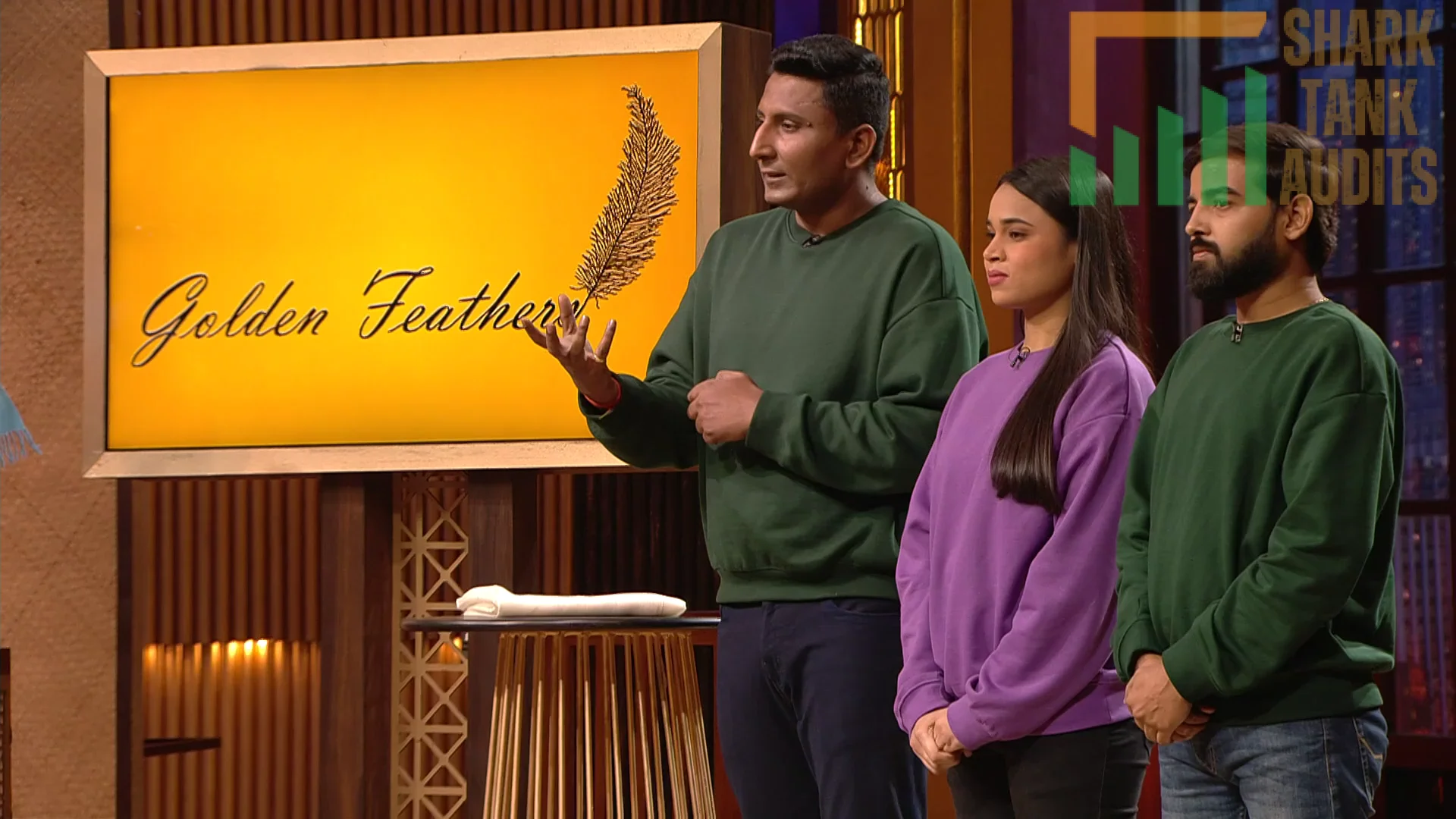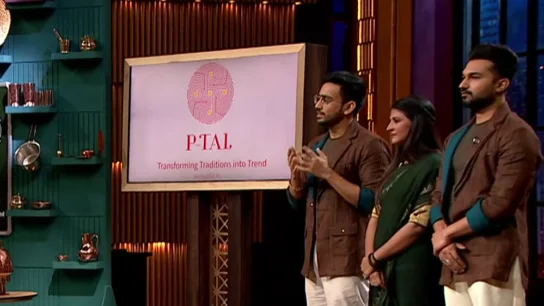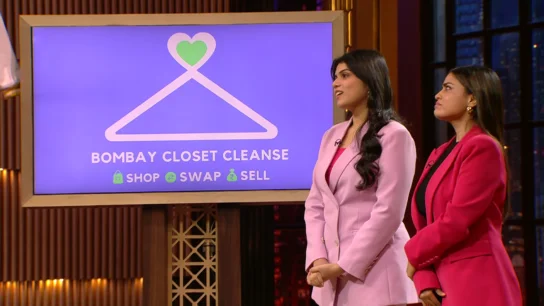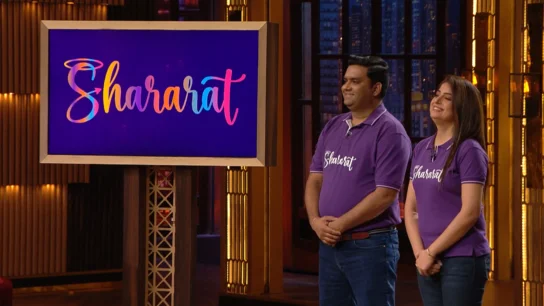Golden Feathers Shark Tank India Episode Review
Website Information:
- Website:- Golden Feathers
- Build on WordPress CMS, Pages build using Elementor Plugin
- SEO Improvement Needed
- ORGANIC TRAFFIC:- 912 organic visitors per month
Founder Insights:
- Radhesh Agrahari, Muskan Sainik, and Abhishek Verma are the founders of Golden Feathers.
- Radhesh Agrahari revolutionized the textiles and paper industry by inventing the 6th natural fiber, sourced from upcycled Butchery Chicken Waste, after dedicating seven years to transforming his idea into a groundbreaking innovation.
- As a social entrepreneur, Agrahari’s business model focuses on solving social issues and empowering artisans directly, ensuring sustainable livelihoods for them and their communities.
- Coming from a traditional family in Fatehpur, Uttar Pradesh, Agrahari grew up in a nine-member household under the leadership of his grandmother, and he supported his education through part-time jobs alongside seven years of extensive research.
- Sustainability has been a driving force in Agrahari’s journey, observing the demand for sustainable products and creating innovative solutions for a greener future.
- Agrahari’s mission aims to make a significant Green Impact globally by promoting sustainable living principles and reducing carbon footprints, which has resulted in the depletion of 7762,762,090 kg of carbon emissions.
- Through his innovation, Agrahari has revived traditional crafts such as Wet Hand Spinning, Wet Hand Carding, and Handloom Weaving, benefiting over 10,000 tribal women artisans.
- Today, Agrahari is globally acclaimed as a remarkable social entrepreneur, his journey and contributions highlighted in various media outlets, publications, and conferences worldwide, demonstrating his ability to merge profitability with compassion in business.
- Muskan explained the process of utilizing chicken waste for textile production.
- Radhesh discussed their design backgrounds and interest in utilizing food waste, particularly chicken waste, for natural fiber production.
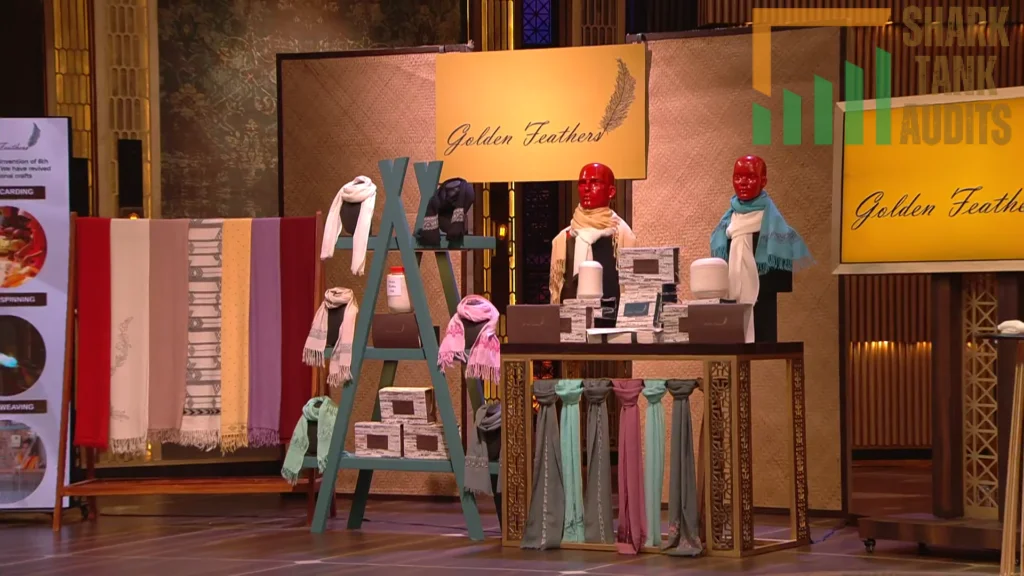
Golden Feathers Overview:
- Presents luxury textile items crafted from recycled chicken waste.
- Founders: Radhesh Agrahari, Muskan Sainik, and Abhishek Verma.
Shark Tank India Episode Review:
- Founders faced challenges in demonstrating a robust business approach and confidence.
- Sharks expressed concerns regarding feasibility and scalability despite the innovative and eco-friendly product.
- Emphasizes the importance of effectively communicating both innovation and business fundamentals.
Shark Tank India Episode AIR Date:
- Episode 37, 12 March 2024
Pitch Details:
- Golden Feathers Seeking $6 thousand (5 Crore) investment for 5% equity.
- Utilizes up-cycled chicken waste for textile products.
- Emphasizes sustainability through training rag pickers and implementing natural sanitation processes.
- Aims to empower tribal women by providing employment opportunities.
- Couldn’t secure a deal with the sharks despite the impactful vision.
Product and Pricing:
- Golden Feathers Offers handmade printing papers, quilts, jackets, shawls, and mufflers.
- Prices range from $24-$603 (Rs. 2,000-50,000).
- Examples include the KORA RANG UNISEX MUFFLER at $30 (Rs. 2,500) and the TANA-BANA UNISEX SHAWL at $603 (Rs. 50,000).
Sharks’ Responses:
- Suggestions included focusing on selling fiber to manufacturers.
- Namita Thapar expressed reservations but wished them success.
- Aman Gupta and Ritesh Agarwal declined investment, but Ritesh pledged a donation of Rs 10 lakh to their associated NGO for job creation.
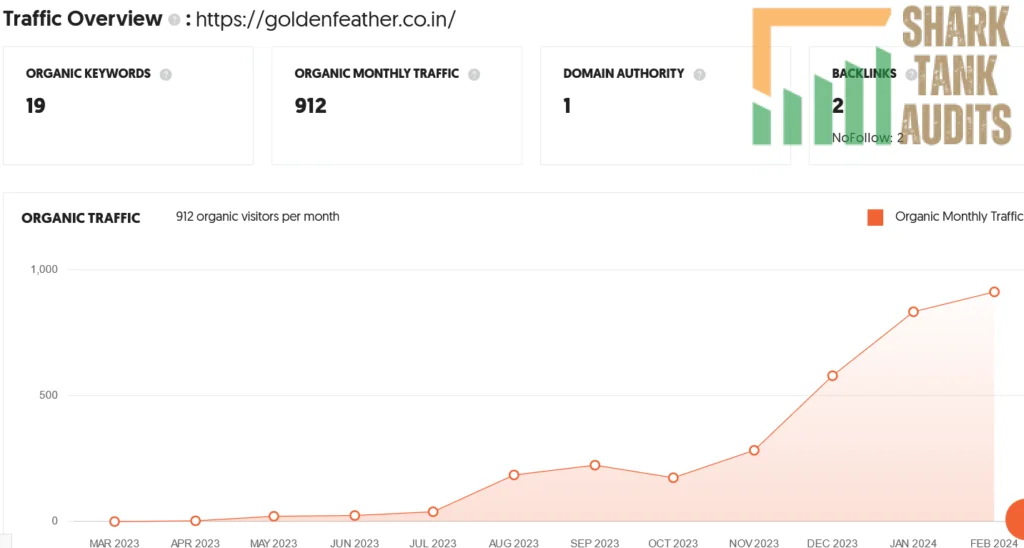
| Aspect | Description | Data/Stat |
|---|---|---|
| Website | Platform | Golden Feathers (https://goldenfeather.co.in/) |
| Built with | WordPress CMS, Elementor Plugin | |
| Organic Traffic | 912 visitors per month | |
| Founders | Names | Radhesh Agrahari, Muskan Sainik, Abhishek Verma |
| Innovation | Product | 6th natural fiber from upcycled butchery chicken waste |
| Mission | Focus Areas | Sustainable living, empowering artisans, reducing carbon footprint |
| Social Impact | Achievements | Revived traditional crafts, empowered 10,000+ tribal women artisans |
| Products | Category | Luxury textiles made from recycled chicken waste |
| Production Practices | Sustainable & Ethical | |
| Shark Tank India | Challenges | Demonstrating business viability & scalability |
| Takeaways | Importance of balancing innovation with a strong business model | |
| Pitch Details | Ask | $5 Crore for 5% equity |
| Products Offered | Handmade paper, quilts, jackets, shawls, mufflers | |
| Price Range | $24 – $603 (Rs. 2,000 – Rs. 50,000) | |
| Target Audience | Demographics | Affluent urban population (25-50 years old) |
| Psychographics | Values | |
| Business Potential | Driver | Growing demand for sustainable products |
| Source | Industry reports on consumer trends | |
| Additional Factor | Rising disposable income | |
| Source | Government data on economic growth | |
| TAM (Total Addressable Market) | Estimate (India) | ₹20,000 crore (USD 2.5 billion) by 2025 |
| Source | Industry estimates based on market research | |
| Marketing Strategy | Content Marketing | Blog posts, infographics, and videos showcasing sustainable processes, product stories, and social impact |
| Social Media Marketing | Platforms | |
| Strategy | ||
| Public Relations | Goal | |
| Collaborations | Strategy | |
| Distribution Strategy | Channels | |
| * | Direct-to-Consumer (D2C) | |
| * | Online Marketplaces | |
| * | Brick-and-Mortar Stores | |
| Advantages (USP) | Unique Selling Proposition | World’s first luxury textiles made from upcycled chicken waste |
| Sustainability & Ethics | Environmentally friendly production empowers tribal women artisans | |
| Luxury Appeal | High-quality handmade products with a unique story | |
| Challenges | Areas | Market Education, Price Point, Scalability |
| Market Education | Need | |
| Price Point | Strategy | |
| Scalability | Solution | |
| Reasons for Success | Trends | Addressing a growing trend for sustainable fashion |
| Social Impact | Strength | |
| Innovation & Quality | Focus | |
| Mitigation Strategies | Transparency | Blog posts, infographics, and videos showcasing sustainable processes, product stories, and social impact |
| Strategic Pricing | Approach | |
| Vertical Integration | Potential | |
| Future Roadmap | Strategy | Increase brand awareness through targeted marketing campaigns |
| Product Line Expansion | Focus | |
| Global Expansion | Target | |
| Technology Integration | Goal |
Golden Feathers: Revolutionizing Sustainable Textiles
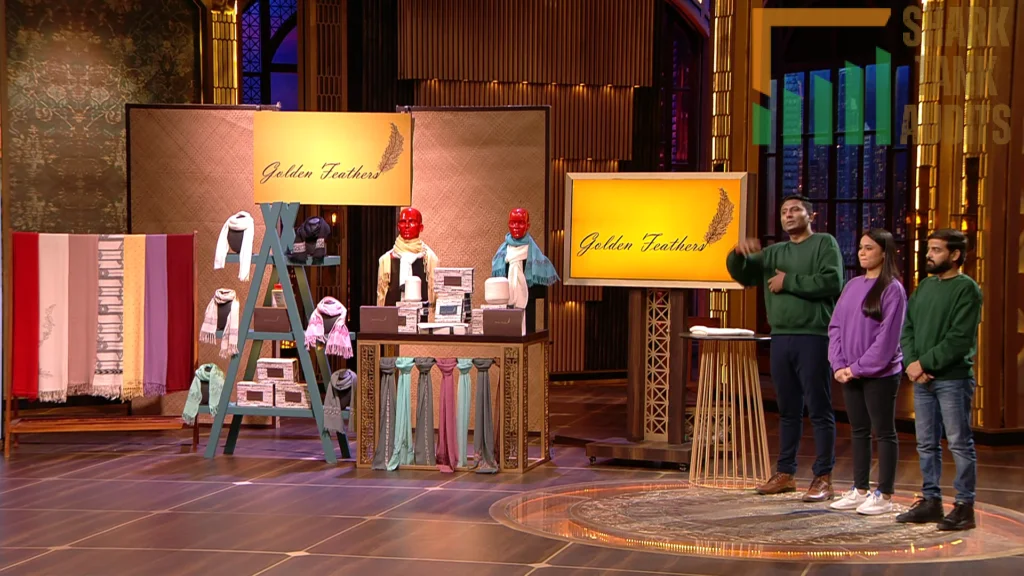
Business Potential in India:
- Growing Demand for Sustainable Products:** Increasing awareness of environmental issues is driving demand for eco-friendly alternatives. (Source: Industry reports on consumer trends)
- Rising Disposable Income:** Growing middle class with higher disposable income fuels spending on premium products. (Source: Government data on economic growth)
Total Addressable Market (TAM):
- Considering India’s population and growing demand for sustainable fashion, the TAM for eco-conscious textiles can be estimated at ₹20,000 crore (USD 2.5 billion) by 2025. (Source: Industry estimates based on market research)
Ideal Target Audience:
- Demographics: Affluent urban population (25-50 years old)
- Psychographics: Environmentally conscious, value ethical production practices, appreciate unique and high-quality products
Marketing Strategy:
- Content Marketing: Create blog posts, infographics, and videos showcasing the sustainable process, product story, and social impact.
- Social Media Marketing: Build a strong presence on Instagram and Facebook, targeting eco-conscious influencers and partnering with sustainable fashion brands.
- Public Relations: Generate media coverage highlighting the innovation, sustainability practices, and social impact.
- Collaborations: Partner with eco-conscious fashion designers and retailers to expand reach.
Distribution Strategy:
- Direct-to-Consumer (D2C): Sell directly through Golden Feathers’ own e-commerce platform.
- Online Marketplaces: Partner with established online marketplaces catering to sustainable fashion.
- Brick-and-Mortar Stores: Explore partnerships with select high-end boutiques and department stores.
Advantages:
- Unique Selling Proposition (USP): Golden Feathers is the World’s first luxury textiles made from upcycled chicken waste.
- Sustainable and Ethical: Golden Feathers Environmentally friendly production process empowers tribal women artisans.
- Luxury Appeal: High-quality handmade products with a unique story.
Golden Feathers Challenges:
- Market Education: Educating consumers about the benefits of recycled materials in luxury textiles.
- Price Point: Balancing affordability with the premium positioning of the brand.
- Scalability: Ensuring consistent production quality and meeting potential demand.
Reasons for Success:
- Addressing a Growing Trend: Caters to the increasing demand for sustainable fashion.
- Strong Social Impact: Empowers local communities and promotes ethical practices.
- Innovation and Quality: Unique product with a focus on luxury craftsmanship.
Mitigation Strategies:
- Transparency: Clearly communicate the sustainable features and benefits of the product.
- Strategic Pricing: Offer a range of products catering to different price points.
- Vertical Integration: Explore possibilities of in-house production or partnerships for scalability.
Future Roadmap:
- Increase Brand Awareness: Implement targeted marketing campaigns to reach a wider audience.
- Product Line Expansion: Develop new product categories while maintaining the brand’s core values.
- Global Expansion: Enter international markets with a high demand for sustainable luxury goods.
- Technology Integration: Utilize technology to streamline production and improve efficiency.
By implementing a comprehensive plan that addresses the challenges and leverages its unique strengths, Golden Feathers can become a leading player in the sustainable luxury textile market. The company’s innovative approach, commitment to sustainability, and focus on social impact position it for significant growth and success.

